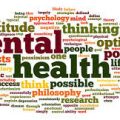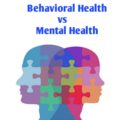What is a Sound or Good Mental Health
A sound mental health refers to a satisfactory level of behavioral and emotional adjustment. It involves the ability and the capacity of an individual to enjoy life, and create a balance between life activities and efforts to achieve psychological resilience.Mental disorders, especially depression account for the highest burden of disability globally. Mental health can be defined as the level of psychological well-being or the absence of mental illness. Mental health encompasses our social well-being including how we feel, act and think. It also determines to a great to an extent how we make choices, handle stress and relate to others. SEE: Behavioral Health vs Mental Health
The World Health Organization (WHO)’s definition of sound mental health also includes self-actualization of one’s intellectual and emotional potential, subjective well-being, perceived self-efficacy, competence, autonomy and inter-generational dependence.
Why is a Good Mental Health Important
A sound mental health is very important at every stage of life, from childhood through adolescence and eventually adulthood. Mental illness such as depression, anxiety, grief, addictions, and other psychological conditions could place a severe strain on mental health which could be detrimental to overall well-being. Mental illnesses are much more common than diabetes, heart disease or cancer.
Available data shows that over 26 percent of all Americans aged 18 years and older meet the criteria for having a mental illness. Serious mental disorders and conditions affect an average of 6 percent of the adult population or approximately 1 in 17 people.
On the global scene, available evidence from the World Health Organization also suggests that about half of the world’s population are affected by mental illness with an impact on their relationships, self-esteem, and ability to function in everyday life.
The current global cost of mental illness according to the World Health Organization (WHO), is nearly $2.5 trillion with a projected increase to over $6 trillion by the year 2030.
Maintaining sound mental health is critical to living a long and healthy life. Sound mental health can enhance one’s life, while poor mental health significantly undermines health and can prevent an individual from living a fulfilled life. An individual’s emotional health can also impact physical health and poor mental health can lead to major problems like substance abuse and anti-social behaviors such as drug and alcohol abuse, physical fights and vandalism.
The Major Characteristics of Sound Mental Health
A good mental health as noted earlier is not just the absence of mental illness, there are several features that epitomizes a state of sound or good mental health.
These positive features of mental and emotional health allow an individual to build strong relationships, partake in meaningful activities and participate in life to the fullest extent possible through productive ventures.
Individuals with good mental health tend to:
- Have a sense of meaning and purpose in their relationships and life activities.
- Have a high level of self-confidence.
- Have a unique sense of contentment.
- Have a zest for living and the ability to laugh and have fun.
- Have a high tendency to learn new things and adapt to change.
- Have the capacity to deal with stress and bounce back from adversity.
- Have a good work-life balance.
- Have the ability to build and maintain fulfilling relationships.
5 Pre-requisites for Sound mental health
When it comes to maintaining sound mental health, most times, the little things can make a huge difference in how we cope with life’s challenges, our overall outlook and well being.
Being mentally healthy does not imply that the individual does not or never go through bad times or experience emotional challenges which are normal parts of life, they do but with strong mental health, they are in a better position to overcome such challenges much faster and bounce back from adversity, trauma, and stress.
There are several things that can help an individual improve his/her mood, become more resilient, and enjoy life more. Some of these include:
#1: Staying Physically Active
Because physical activity promotes health, the impact also extends to the brain largely due to the fact that the mind and the body are intrinsically linked. Being physically active causes the release of endorphins a class of powerful chemicals that lift mood and provide added energy to the body. Engaging in regular exercise can have a major impact on mental and emotional health and also help relieve stress, improve memory, and lead to better sleep. A Dutch study involving more than 7000 adults found that engaging in exercise reduced the risk of developing anxiety or mood disorder over the following three years, a Finnish study also showed that that low levels of exercise during early years of life (childhood or adolescence) predicted later development of psychosis and schizophrenia.
#2: Manage Stress Properly
The stress hormone known as cortisol, is public health enemy number one. Stress can significantly affect an individual’s mental and emotional health, therefore keeping stress in check is vital for a sound mental health. Elevated cortisol levels in the body lower immune function, increase weight gain, increase blood pressure and interfere with learning and memory. Having a healthy face-to-face social interaction with friendly people or loved ones is an effective way to calm the nervous system and relieve stress. In addition, maintaining a good work-life balance, making leisure time a priority, listening to an uplifting or good music, and reading inspiring books can also help in the management of stress. A study conducted by members of the Society for Neuroscience revealed that stress no matter its cause does alter brain circuitry in ways that can have long-term effects on mental health. Dipesh Chaudhury of the Mount Sinai School of Medicine in New York who presented the findings stated that “traumatic events appear to cause depression by derailing the brain’s reward system, which normally causes pleasurable feelings whenever we engage in fun activities’’.
#3: Good sleep
Many mental health problems including psychotic experiences are caused by lack of sleep, when it comes to emotional and mental health, getting enough quality sleep is a key requirement and not a luxury. Skipping even a few hours of sleep on a continuous basis can significantly affect mood, energy levels, mental sharpness, and ability to handle stress. A new study conducted at the University of Oxford reported that people who had undertaken a course of cognitive behavioral therapy (CBT) designed specifically to treat insomnia experienced improved sleep which also reduced their levels of paranoia and hallucinations, they also recorded improvements in depression and anxiety.
#5: Social Interaction
Low levels of social interactions are one of the major factors influencing mental health. As social creatures with an intrinsic need for emotional connection with others, humans are negatively affected by decreased levels of positive connections to people. Optimum mental and emotional health is easily achieved with the company of individuals (face to face) who share like passion. Isolation breeds social alienation which often promotes depression anxiety and other undesirable mental conditions. A meta-analysis, which encompassed 148 different studies involving more than 300,000 participants, revealed that social isolation can have a very serious negative impact on lifespan and its impact could be as much as 50%.
Go For Food That Boost Moods and Avoid Food That Adversely Affect Mental Health
Diet can play a very important role in maintaining a balanced mental health. Around 70 percent of individuals who do not report daily mental health problems eat fresh fruit on a daily basis. A diet that provides adequate amounts of vitamins and minerals, complex carbohydrates, amino acids, and essential fats is critical for a sound mental health.
Foods that boost mood
- Leafy greens such as Spinach, lettuce, kale, Brussels sprouts.
- Fatty fish such as salmon rich in Omega-3s.
- Nuts such as Groundnuts, walnuts, almonds, cashews.
Food That Ruin Mood
- Coffee and other caffeine-rich foods.
- Refined carbs (such as white rice or white flour).
- Alcohol and other intoxicants.
- Fried food and food with “partially hydrogenated” oil and high levels of chemical preservatives or hormones.
- Fast foods and sugary snacks.












4 Comments